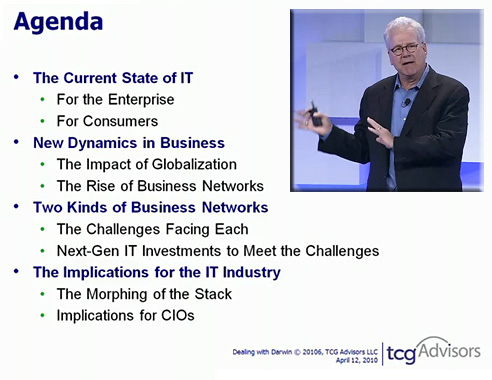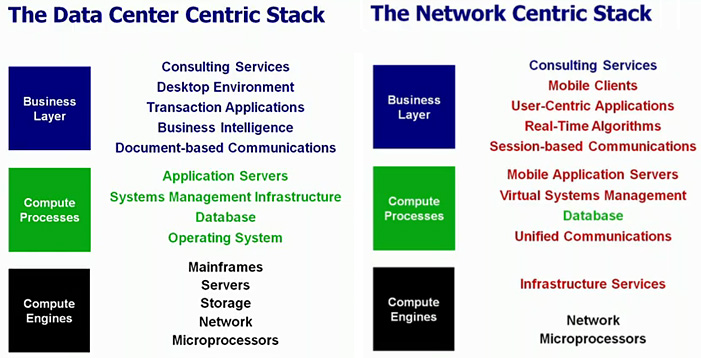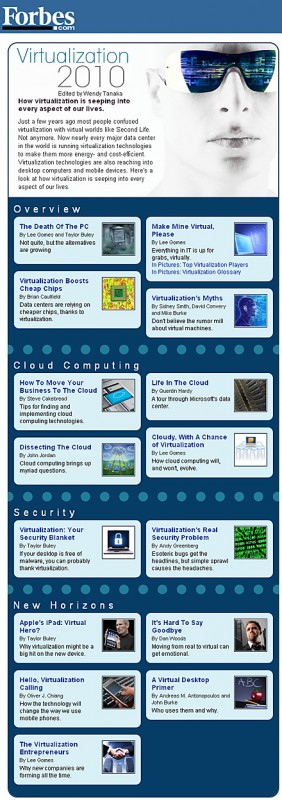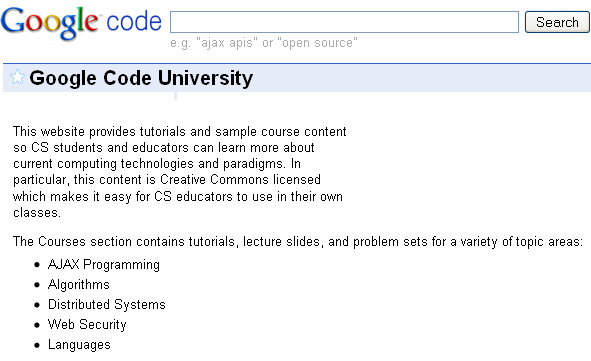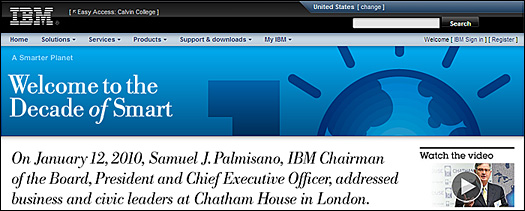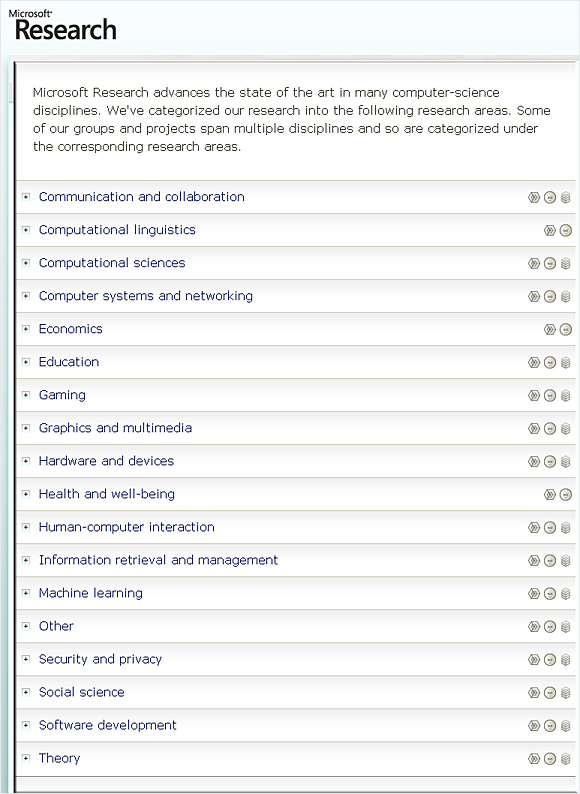Geoffrey Moore: April 2010 Presentation – Core, Content, and the Cloud — my thanks to Mr. Rick DeVries, Calvin College IT Dept. for this resource
TR10: Cloud Programming — from Technology Review
A new language will improve online applications.
Cloud computing offers the promise of virtually unlimited processing and storage power, courtesy of vast data centers run by companies like Amazon and Google. But programmers don’t know how best to exploit this power.
Also see:
http://databeta.wordpress.com/2009/12/16/bloom-and-dedalus/
PHP: What you need to know to play with the web — SmashingMagazine.com by Christian Heilmann
What Is PHP?
PHP is a server-side language that has become a massive success for three reasons:
- It is a very easy and forgiving language. Variables can be anything, and you can create them anytime you want.
- It is part of the free LAMP stack (Linux, Apache, MySQL, PHP) and thus available on almost any server you can rent on the Web.
- It does not need a special editor, environment or build process. All you do is create a file of the .php file type, mix PHP and HTML and then put it on your server for rendering.
From DSC:
Christian makes this sound so easy. However, in my experience, programmers have a different skillset that is not easily mastered or obtained. They have a different way of thinking, and the syntax of coding languages is not something many people enjoy working with. That is why there seems to be two camps: web designers (who focus on the front-end of the web) and web developers (who focus on the back end of things such as application development/programming and database integration). Sometimes, a person can bridge those two worlds…but rare is the person who can stay up-to-date and do both sides of the house well…and consistently over time.
Cleaving Computer Science into new degrees — from acm.org by Mark Guzdial
The School of Computer Science (SCS) is focused on the traditional definition of computer science. The School of Interactive Computing (IC) looks at the boundary between the computer and everything else. The School of Computational Science and Engineering (CSE) focuses on the application of computing for advancing science and engineering.
I find that this cleaving of computer science works well for understanding the tensions I see between groups of computer scientists, each exploring a different piece of our ever-broadening field.
…
In a recent issue of Communications of the ACM, Dennis Groth and Jeffrey Mackie-Mason argue that we need “informatics” degrees as something separate than a computer science degrees.
There’s another reason to consider new degrees: the tyrannies of a bachelor’s degree, defined in so many contact/credit hours, so many years. Can we fit everything in for all of computing?
…
We tussle over these degrees and names because, in part, we fear creating a new name. We worry that students won’t be interested in a degree from computing that’s not named “computer science.” IC co-owns our BS in Computational Media ![]() (about 300 students, ~30% female, placing students at places like Electronic Arts and Pixar) and a PhD in Human-Centered Computing
(about 300 students, ~30% female, placing students at places like Electronic Arts and Pixar) and a PhD in Human-Centered Computing ![]() (one of the few PhD programs in a computing school that is over 50% female). Students are willing to take a gamble, and we’ll draw on a different demographic of students.
(one of the few PhD programs in a computing school that is over 50% female). Students are willing to take a gamble, and we’ll draw on a different demographic of students.
Columbia to combine journalism, computer science in new digital media focus — eSchoolNews.com
From DSC:
Given what has been and is occurring within journalism — and publishing in general — this is a great move by Columbia. With the ability to offer interactive, multimedia-based, digital storytelling on devices like the iPad, these types of skills will come in handy. Along those lines, I think it’s very beneficial to students when they encounter such cross-disciplinary assignments, projects, and environments — as that’s what teams in the real-world have to do.
“Even though the iPad looks like an iPhone built for the supersize inhabitants of Pandora, its ambitions are as much about shrinking our laptops as about stretching our smartphones. Yes, the iPad is designed for reading, gaming, and media consumption. But it also represents an ambitious rethinking of how we use computers. No more files and folders, physical keyboards and mouses. Instead, the iPad offers a streamlined yet powerful intuitive experience that’s psychically in tune with our mobile, attention-challenged, super-connected new century. Instant-on power. Lightning-fast multitouch response. Native applications downloaded from a single source that simplifies purchases, organizes updates, and ensures security.”
From DSC:
From my perspective, the iPad will usher in more interactivity, more multimedia-based content, more end-user control, more choice about the type of media one consumes (even on the same article/topic), and the ability to quickly “drill down” more deeply into a topic.
Also see — and item originally from:
13 ways of looking at an iPad — from brainstormtech.blogs.fortune.cnn.com
Academy & Industry Research Collaboration Center ( AIRCC ) is a non profit organization promoting science & engineering research worldwide with out any discrimination. It’s acting as a bridge between young and experienced professionals through series of activities such as workshops, conferences and journals etc.
AIRCC depends on researchers, academicians and corporate support for bridging relationships with existing scientific & engineering organizations and customizing relationships with standard bodies. The main purpose of this forum is to promote new research and applications in the field of Computer science & Engineering and allied fields.
- International Journal of Network Security & Its Applications ( IJNSA )
- International journal of Computer Networks & Communications ( IJCNC )
- International Journal of Wireless & Mobile Networks ( IJWMN )
- International Journal of Computer Science & Information Technology ( IJCSIT )
- The International Journal of Multimedia & Its Applications ( IJMA )
- Journal on Applications of Graph Theory in Wireless Ad hoc Networks and Sensor Networks ( J GRAPH-HOC )
- International Journal of Managing Information Technology ( IJMIT )
- International Journal of Database Management Systems ( IJDMS )
- International Journal of Next-Generation Networks ( IJNGN )
- International Journal of Software Engineering & Applications ( IJSEA )
- International Journal of Artificial Intelligence & Applications ( IJAIA )
- Signal & Image Processing : An International Journal ( SIPIJ )
- International Journal of Grid Computing & Applications ( IJGCA )
- International Journal of UbiComp ( IJU )
- International Journal of Web & Semantic Technology ( IJWesT )
- International Journal of Ad hoc, Sensor & Ubiquitous Computing ( IJASUC )
- International Journal on Web Service Computing ( IJWSC )










